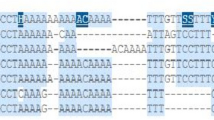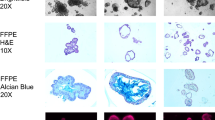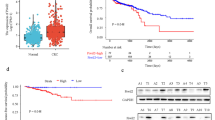Abstract
Endothelial nitric oxide synthase (eNOS)–derived nitric oxide (NO) is involved in numerous physiologic and pathophysiologic process including tumor angiogenesis and apoptosis. Accordingly, the present study analyzed polymorphisms of eNOS gene and their impact on the prognosis for patients with colorectal cancer. Four hundred and forty-four consecutive patients with surgically resected colorectal adenocarcinoma were enrolled in the present study. The genomic DNA was extracted from fresh colorectal tissue and 2 polymorphisms of eNOS gene (eNOS T786C and eNOS G894T) determined using a real-time PCR genotyping assay. The 2 eNOS gene polymorphisms were successfully amplified, and the frequencies of each genotype are as follows [T786C: TT (82.2%), TC (16.9%), CC (0.9%); G894T: GG (82.0%), GT (17.3%), TT (0.7%)]. Multivariate survival analysis including stage, age, site of disease, and CEA level showed that these polymorphisms were not associated with survival. For the clinicopathologic parameters, CEA level and TNM stage were significant prognostic factors in a Cox model for survival. The eNOS gene polymorphisms investigated in this study were not found to be an independent prognostic marker for Korean patients with surgically resected colorectal cancer. However, further studies are warranted to clarify the role of the eNOS gene polymorphisms as a prognostic biomarker for colorectal patients with cancer.
Similar content being viewed by others
References
Fukumura D, Kashiwagi S, Jain RK. The role of nitric oxide in tumour progression. Nat Rev Cancer. 2006;6(7):521–34.
Choi BM, et al. Nitric oxide as a pro-apoptotic as well as anti-apoptotic modulator. J Biochem Mol Biol. 2002;35(1):116–26.
Hu DE, et al. Tumor cell-derived nitric oxide is involved in the immune-rejection of an immunogenic murine lymphoma. Cancer Res. 2004;64(1):152–61.
Jadeski LC, Chakraborty C, Lala PK. Nitric oxide-mediated promotion of mammary tumour cell migration requires sequential activation of nitric oxide synthase, guanylate cyclase and mitogen-activated protein kinase. Int J Cancer. 2003;106(4):496–504.
Xu W, et al. Mapping of the genes encoding human inducible and endothelial nitric oxide synthase [NOS2 and NOS3] to the pericentric region of chromosome 17 and to chromosome 7, respectively. Genomics. 1994;21(2):419–22.
Nakayama M, et al. T-786 → C mutation in the 5′-flanking region of the endothelial nitric oxide synthase gene is associated with coronary spasm. Circulation. 1999;99(22):2864–70.
Yoshimura M, et al. A missense Glu298Asp variant in the endothelial nitric oxide synthase gene is associated with coronary spasm in the Japanese. Hum Genet. 1998;103(1):65–9.
Veldman BA, et al. The Glu298Asp polymorphism of the NOS 3 gene as a determinant of the baseline production of nitric oxide. J Hypertens. 2002;20(10):2023–7.
Xu W, et al. The role of nitric oxide in cancer. Cell Res. 2002;12(5-6):311–20.
Hefler LA, et al. Polymorphisms of the endothelial nitric oxide synthase gene in ovarian cancer. Gynecol Oncol. 2002;86(2):134–7.
Medeiros R, et al. Endothelial nitric oxide synthase gene polymorphisms and genetic susceptibility to prostate cancer. Eur J Cancer Prev. 2002;11(4):343–50.
Medeiros RM, et al. Outcome in prostate cancer: association with endothelial nitric oxide synthase Glu-Asp298 polymorphism at exon 7. Clin Cancer Res. 2002;8(11):3433–7.
Hamilton SRAL. WHO Classification. Lyon, France: IARC Press; 2000.
Greene FLPD, Fleming ID. The AJCC Cancer Staging Manual. 6th edn ed. New York: Springer; 2002.
Fukumura D, et al. Predominant role of endothelial nitric oxide synthase in vascular endothelial growth factor-induced angiogenesis and vascular permeability. Proc Natl Acad Sci U S A. 2001;98(5):2604–9.
Hagendoorn J, et al. Endothelial nitric oxide synthase regulates microlymphatic flow via collecting lymphatics. Circ Res. 2004;95(2):204–9.
Yeh CC, et al. An intron 4 VNTR polymorphism of the endothelial nitric oxide synthase gene is associated with early-onset colorectal cancer. Int J Cancer. 2009;124(7):1565–71.
Cheon KT, et al. Gene polymorphisms of endothelial nitric oxide synthase and angiotensin-converting enzyme in patients with lung cancer. Lung. 2000;178(6):351–60.
Lee KM, et al. Nitric oxide synthase gene polymorphisms and prostate cancer risk. Carcinogenesis. 2009;30(4):621–5.
Hefler LA, et al. Polymorphisms of the endothelial nitric oxide synthase gene in breast cancer. Breast Cancer Res Treat. 2006;98(2):151–5.
Ghilardi G, et al. Vascular invasion in human breast cancer is correlated to T → 786C polymorphism of NOS3 gene. Nitric Oxide. 2003;9(2):118–22.
Riener EK, et al. Polymorphisms of the endothelial nitric oxide synthase gene in women with vulvar cancer. Gynecol Oncol. 2004;93(3):686–90.
Choi JY, et al. Genetic polymorphisms of eNOS, hormone receptor status, and survival of breast cancer. Breast Cancer Res Treat. 2006;100(2):213–8.
Funke S, et al. Genetic Polymorphisms in Genes Related to Oxidative Stress [GSTP1, GSTM1, GSTT1, CAT, MnSOD, MPO, eNOS] and Survival of Rectal Cancer Patients after Radiotherapy. J Cancer Epidemiol. 2009;302047:1–6.
Author information
Authors and Affiliations
Corresponding author
Additional information
Jong Gwang Kim and Gyu Seog Choi contributed equally to this work.
Rights and permissions
About this article
Cite this article
Kim, Y.J., Lee, S.J., Kim, J.G. et al. No association of the eNOS gene polymorphisms with survival in patients with colorectal cancer. Med Oncol 28, 1075–1079 (2011). https://doi.org/10.1007/s12032-010-9647-4
Received:
Accepted:
Published:
Issue Date:
DOI: https://doi.org/10.1007/s12032-010-9647-4




